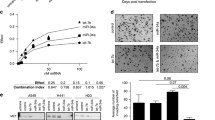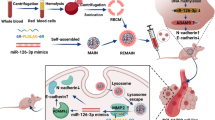Abstract
MicroRNAs (miRNAs) can function as tumor suppressors and might provide an efficient strategy for annihilating cancer. Specific miRNAs can be reintroduced into tumor cells to elicit the tumor suppressor activities. We show that systemically delivered, synthetic miRNA mimics in complex with a novel neutral lipid emulsion are preferentially targeted to lung tumors and show therapeutic benefit in mouse models of lung cancer. The delivery was demonstrated using mimics of the tumor suppressor microRNA-495 which is found downregulated in most lung cancer. Systemic treatment of a Kras-activated autochthonous mouse model of non-small cell lung cancer (NSCLC) led to a significant decrease in tumor burden. Specifically, mice treated with microRNA-495 displayed a large reduction in tumor area compared to mice treated with a miRNA control. These findings provide direct evidence that systematically delivered synthetic miRNA mimics to the mammalian lung can inhibit tumor proliferation and support the promise of miRNAs as a targeted therapy for lung cancer in future.




Similar content being viewed by others
References
Jemal A, Siegel R, Ward E, Hao Y, Xu J, Murray T, et al. Cancer statistics. CA Cancer J Clin. 2008;58:71–96,2008.
Bartel DP. MicroRNAs: genomics, biogenesis, mechanism, and function. Cell. 2004;116:281–97.
Baranwal S, Alahari SK. miRNA control of tumor cell invasion and metastasis. Int J Cancer. 2010;126:1283–90.
Iorio MVCroce CM. microRNA involvement in human cancer. Carcinogene. 2012.
Jiang X, Huang H, Li Z, He C, Li Y, Chen P, et al. MiR-495 is a tumor-suppressor microRNA down-regulated in MLL-rearranged leukemia. Proc Natl Acad Sci U S A. 2012;109:19397–402.
Chen SM, Chen HC, Chen SJ, Huang CY, Chen PY, Wu TW, et al. MicroRNA-495 inhibits proliferation of glioblastoma multiforme cells by downregulating cyclin-dependent kinase 6. World J Surg Oncol. 2013;11:87.
Li Z, Cao Y, Jie Z, Liu Y, Li Y, Li J, et al. miR-495 and miR-551a inhibit the migration and invasion of human gastric cancer cells by directly interacting with PRL-3. Cancer Lett. 2012;323:41–7.
Bader AG, Brown D, Winkler M. The promise of microRNA replacement therapy. Cancer Res. 2010;70:7027–30.
McCormick F. Cancer gene therapy: fringe or cutting edge? Nat Rev Cancer. 2001;1:130–41.
Roth JA. Adenovirus p53 gene therapy. Expert Opin Biol Ther. 2006;6:55–61.
Melo SA, Ropero S, Moutinho C, Aaltonen LA, Yamamoto H, Calin GA, et al. A TARBP2 mutation in human cancer impairs microRNA processing and DICER1 function. Nat Genet. 2009;41:365–70.
Wiggins JF, Ruffino L, Kelnar K, Omotola M, Patrawala L, Brown D, et al. Development of a lung cancer therapeutic based on the tumor suppressor microRNA-34. Cancer Res. 2010;70:5923–30.
Zhang Y, Liu D, Chen X, Li J, Li L, Bian Z, et al. Secreted monocytic miR-150 enhances targeted endothelial cell migration. Mol Cell. 2010;39:133–44.
Brown RH, Walters DM, Greenberg RS, Mitzner W. A method of endotracheal intubation and pulmonary functional assessment for repeated studies in mice. J Appl Physiol. 1985;87:2362–5,1999.
Jackson EL, Willis N, Mercer K, Bronson RT, Crowley D, Montoya R, et al. Analysis of lung tumor initiation and progression using conditional expression of oncogenic K-ras. Genes Dev. 2001;15:3243–8.
Esquela-Kerscher A, Trang P, Wiggins JF, Patrawala L, Cheng A, Ford L, et al. The let-7 microRNA reduces tumor growth in mouse models of lung cancer. Cell Cycle. 2008;7:759–64.
Landen Jr CN, Chavez-Reyes A, Bucana C, Schmandt R, Deavers MT, Lopez-Berestein G, et al. Therapeutic EphA2 gene targeting in vivo using neutral liposomal small interfering RNA delivery. Cancer Res. 2005;65:6910–8.
Cho WC. OncomiRs: the discovery and progress of microRNAs in cancers. Mol Cancer. 2007;6:60.
Volinia S, Calin GA, Liu CG, Ambs S, Cimmino A, Petrocca F, et al. A microRNA expression signature of human solid tumors defines cancer gene targets. Proc Natl Acad Sci U S A. 2006;103:2257–61.
Guo J, Miao Y, Xiao B, Huan R, Jiang Z, Meng D, et al. Differential expression of microRNA species in human gastric cancer versus non-tumorous tissues. J Gastroenterol Hepatol. 2009;24:652–7.
Motoyama K, Inoue H, Nakamura Y, Uetake H, Sugihara K, Mori M. Clinical significance of high mobility group A2 in human gastric cancer and its relationship to let-7 microRNA family. Clin Cancer Res. 2008;14:2334–40.
Author information
Authors and Affiliations
Corresponding author
Additional information
An erratum to this article can be found online at http://dx.doi.org/10.1007/s13277-016-5471-6.
The Editor-in-Chief has decided to retract this article. It has been found that the authors have plagiarized substantial parts from another article.
An erratum to this article is available at http://dx.doi.org/10.1007/s13277-016-5471-6.
About this article
Cite this article
Ai, C., Jiang, R., Fu, L. et al. RETRACTED ARTICLE: MicroRNA-495 mimics delivery inhibits lung tumor progression. Tumor Biol. 36, 729–735 (2015). https://doi.org/10.1007/s13277-014-2687-1
Received:
Accepted:
Published:
Issue Date:
DOI: https://doi.org/10.1007/s13277-014-2687-1




